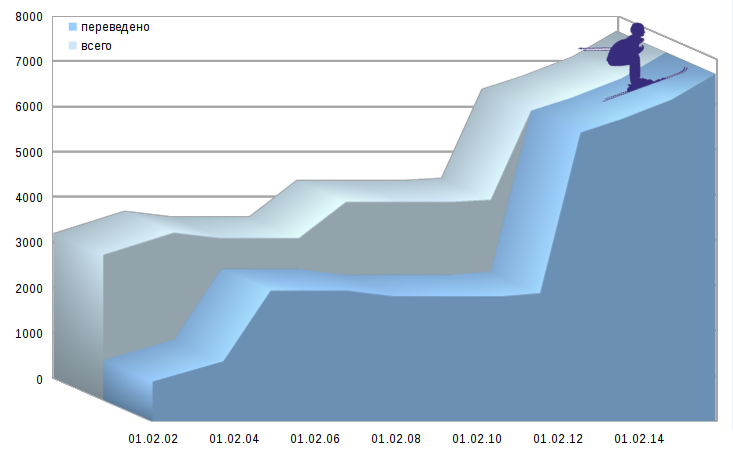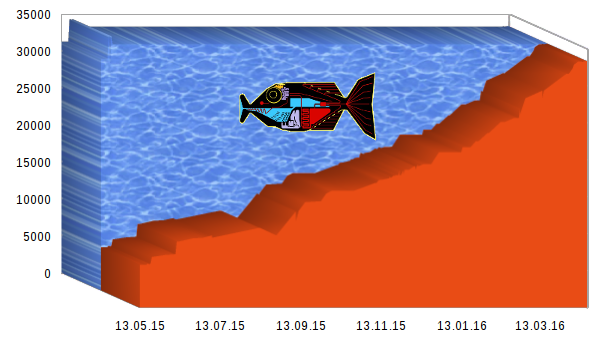PostgreSQL in Russian seriously and for a long time
It is finished!

Our company has officially completed the translation of the current version of the PostgreSQL documentation into Russian, and in this publication we want to tell how it was. We would also like to talk about the path we have taken to achieve this goal (and which directions we tried), but this is perhaps a topic for a separate article.
The translation of PostgreSQL itself into Russian began back in 2001, then only postgresql 7.1 version came out, and in postgresql itself, including the efforts of our developers, the possibility of localizing messages appeared (see here ). For the first time, the translation of messages into Russian was included in version 7.2, along with translations into French, German, Swedish, Chinese and Czech.
Outside was the encoding KOI8-R. Windows 2000, Linux 2.4.1, RHEL 2.1, Debian Woody. pgadmin ii. Ubuntu? No, not heard.
')
In the server messages 7.2, about 30% were translated into Russian (881 messages from 3205). Documentation for the server 7.2 occupied about 1000 pages. January 2005 - for version 8.0, about 80% (2888 messages) were translated. Windows 2003, Linux 2.6.10, RHEL 4, Debian Sarge, Ubuntu - oh, have already heard something with warts.
For version 9.0, the share of translation decreased to 64% (2765 posts).

Finally, in 2012 on version 9.2 we caught up - 100% (6388 posts). (Now in version 9.5, 7675 messages have been translated. The size of messages with a translation of about 1.8 MB.)
After that, I wanted more. More than translating pgadmin and its site. Much more. And there was more - documentation. The official site had links only to French and Japanese translations. It's a challenge! At the time of release 9.3, the documentation was already about 2000 pages (not counting the Release Notes), so this is a challenge again! It is impossible not to notice that attempts to translate documentation have already been made. It seems that the very first information about which is preserved is the translation of documentation for version 6.5.2 , made then probably by young and hot guys from Sergiev Posad as early as the 20th century AD
Then there was another translation, already in our time, but it was not complete, and the quality left it to be desired. You can find traces of another attempt, also not crowned. Therefore, it was decided that it is easier to start something new than to wash it. And in another family.
At the beginning of 2013, the translation of the first two sections of the documentation was completed (about 400 pages). In 2015, our company was formed, which chose one of its priorities to complete the translation of documentation. And the work began to boil. At the entrance, we had the documentation on version 9.4 for 2000 pages and the translated beginning to 400. In June, 25% were translated, in December 57%, in April the translation of documentation for 9.4 was completed. In May 2016, the translation is synchronized with version 9.5 and we received completely Russian documentation (2xxx pages, the volume of the raw text together with the translation is ~ 18 MB).
The result is such a relief:

Finally, at the moment we are going on par with version 9.6 (beta2, beta3, ...) and will release the full documentation in Russian at the time of release of the product.
Fortunately, we managed to use the specialized version of RUS-Studio, which is undergoing closed testing. Thanks to this, we were able to check the text at the translation stage and identify errors, some of which we have fun for and will see below. Our errors, so that we have the right, although these types of errors are ubiquitous.
Our pearls
Error RUS-Studio: A000 Violation of falsity: “Business survived”! = “Restored chat between users”
RUS-Studio Questions: Q075 Load on LOL-what? Tables are exposed to LOL-what? Tables can LOL cause?
When the client application connects to the server, it specifies the PostgreSQL username, as well as with the normal user login on the Unix-like OS.Warning -Studio: W203 English-like-sentence detected.
This provides a higher level of reliability, but only in the case of careful work of the system administrator when installing and configuring these two servers.Question of RUS-Studio: Q088 And how attentive is your work?
For example, during an application's life cycle, 10% of changes are important customer data, the other 90% of changes are less important for business and can be easily restored when they are lost (for example, chat between users).Error -Studio: A000 Fault violation: “Workload”! = “Life cycle”
Original:
For example, an application workload might consist of: 10% of changes are important customer details, while there is a loss of information, such as chat messages between users.
Error RUS-Studio: A000 Violation of falsity: “Business survived”! = “Restored chat between users”
Users should understand that tables that are subject to high load on an update on a master server are more likely to cause cancellation of long requests on a standby one.Error -Studio: R005 A very complex sentence.
RUS-Studio Questions: Q075 Load on LOL-what? Tables are exposed to LOL-what? Tables can LOL cause?
In the normal (not recovery) mode, the execution of the DROP USER or DROP ROLE command for a role that has the ability to connect and the user is currently connected, nothing happens for this user — he continues to remain connected.Error -Studio: B901 Template break.
Exhaust quotas will cause the same bad consequences as the lack of disk space itself.Warning -Studio: W051 The degree of curvature of the sentence exceeds the acceptable level in the second derivative.
Trigger functions must use version 1 of the function manager interface.Error -Studio: R00E The text in English was revealed.
Allows the created user to open sessions. This is the default behavior.Error -Studio: L102 Lossy compression detected.
Original:
It can be used as the initial session user identifier. This is the default.
Since these databases may change during the creation of a copy, the estimate can only be an approximation and not give 100% accuracy.Error -Studio: MU003 Signs of misunderstanding of the meaning are revealed.
Original:
Since this is 100%.
Print the path for placing the code of library objects.Error -Studio: N3 !: Incorrect solution of the combinatorics problem.
Original:
Print the location of object code libraries.
On platforms where it is supported, the server will try to fix the memory snapshots in case of accidents. This allows you to diagnose and prevent potential problems in the future.Warning RUS-Studio: The simplification of the proposal was revealed as a solution to the problem of misunderstanding.
Original:
Where do you need to go? This is what you see.
Ignore waiting for the server to start or stop.Offer from RUS-Studio: S021 For people with a complex inner world to use: "Do not ignore the expectation of me."
Original:
Do not wait for startup or shutdown to complete.
All these errors were ruthlessly corrected, but if you, while studying the documentation in our translation, meet others, write to us . We very much hope that our documentation will be as good as the original.
You may ask: Why was it really necessary to translate really very sensible documentation? Of course, the one who asks this question has already read the original and, therefore, is able to understand English, and probably will continue to read it, and perhaps not less exciting mailing lists.
However, for those who are not yet familiar with this wonderful DBMS, the lack of sufficient knowledge of the English language, in our deep conviction, should not be an obstacle to learning it. This is both beginner administrators / developers, and students, and even schoolchildren (yes, the documentation contains material on the basics of SQL, which could be understandable by a hedgehog).
In addition, the very fact that she is very intelligent, in itself, justifies the efforts to translate it. In addition, taking our translation as a basis, we develop teaching aids and courses with the same level of quality and completeness of the material that we can find in the original.
And finally, our Postgres Pro product, built on the basis of PostgreSQL, is included in the register of domestic software, which means it is primarily aimed at Russian-speaking users and should have Russian documentation. The translation of the vanilla version is our contribution to the development of the entire Russian-language community postgres.
As a result of the months and megabytes of the work done, the event took place in the appearance in the list of translations on the page https://www.postgresql.org/docs/ a modest link Russian .
Welcome!
Source: https://habr.com/ru/post/307612/
All Articles